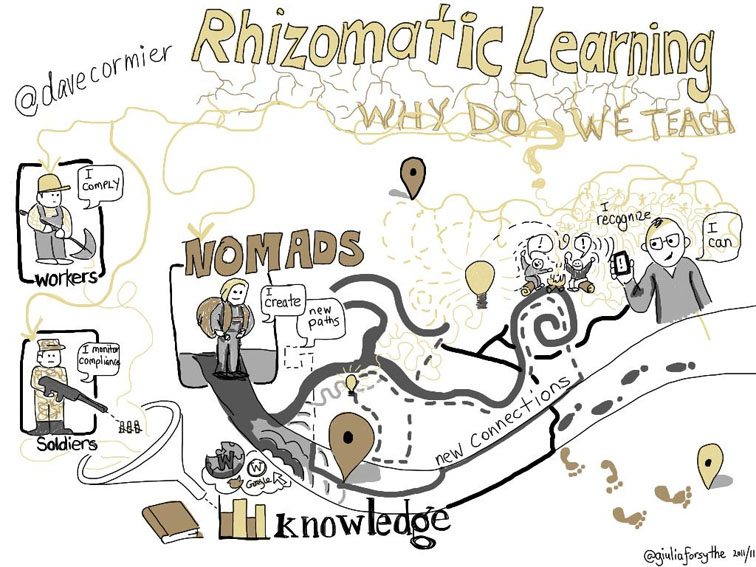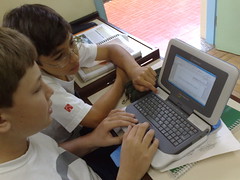In Dave Cormier's blog, he states importance of acknowledging that "learners come from different contexts, that they need different things, and that presuming you know what those things are is like believing in magic.”
As I was reading up on Rhizomatic learning, I came across a blog, Teach Thought who shares a definition of Rhizomatic learning. “...knowledge can only be negotiated, [and is] a personal knowledge-creation process with mutable goals and constantly negotiated premises.” The part of this somewhat complex definition that really caught my attention was the "knowledge can only be negotiated" - meaning that the learner will decide on what they want to take out something. The learner can take as much or as little as they wish... they can dig deep or scratch at the surface. The other aspect of the definition that grabbed my attention was the "personal knowledge creation process". Seems kind of obvious, right? Students developing their own understanding based on prior knowledge or experience and that this understanding would continue to be shaped through interactions.
 Last week's discussion with Dave Cormier and Rhizomatic Learning really resonated with me. Why? Because it really focuses on the student as an individual who comes with all kinds of experiences and that these experiences can shape the way they learn. Hmmm... Kind of seems obvious, right?? It also emphasizes the importance of looking LESS at "THE DATA" and more on how teachers need to explore, experiment and examine many ways of learning. There is also an emphasis less on the teacher as the center or the "Sage on the Stage" but instead on the learner and how he or she learns best. (What?? Imagine that??)
Last week's discussion with Dave Cormier and Rhizomatic Learning really resonated with me. Why? Because it really focuses on the student as an individual who comes with all kinds of experiences and that these experiences can shape the way they learn. Hmmm... Kind of seems obvious, right?? It also emphasizes the importance of looking LESS at "THE DATA" and more on how teachers need to explore, experiment and examine many ways of learning. There is also an emphasis less on the teacher as the center or the "Sage on the Stage" but instead on the learner and how he or she learns best. (What?? Imagine that??) In many ways Rhizomatic Learning seems to emphasis the Multiple Intelligences or "The Many Ways of Knowing". What I also really appreciated was not only does it emphasize that learning is NOT a linear lock-step process, but sometimes chaotic and messy. As we participated in the discussion I kept thinking of how the brainstorm is often the most natural way of thinking of connections and ideas. I also started thinking that Cross-curricular teaching also fits in with this model. Aside for the ease of scheduling or assigning marks, it's unfortunate that subjects are so compartmentalized. It's not the way our jobs or our lives are organized. The skills that one needs or accesses in a day overlap. Teachers of primary and middle years have the benefit of being able to cross curricularly plan for the most part, but unfortunately at the high school level there is still the compartmentalization of learning. I suppose this issue could be somewhat alleviated through more collaboration and cross-curricular planning among teachers - which can take some coordination and time.
Rhizomatic learning embraces the way learning naturally occurs and that is it sometimes is messy and a bit random. I think perhaps the key role of educators is helping students to fully understand how they learn best, how their own experiences can change their perceptions on what and how they learn, and to understand the importance of appreciating how different experiences can change our perceptions. I also think that with this philosophy there is greater importance placed on teachers in examining the inquiry stance and the importance of asking questions, critically evaluating and analyzing, then asking more questions.
I have been exploring the importance of asking questions in the context of Genius Hour. As you can tell I am pretty excited about Genius Hour and it's connections not only to digital learning, but it's roots in inquiry. Genius Hour is giving students the opportunity to explore their passions and interests, but more importantly how to form "big" questions, examine the best sources to locate answers, critically evaluate and analyze and form more questions. So, going back to the definition that I started with in this post on Rhizomatic learning, "...personal knowledge-creation process with mutable goals and constantly negotiated premises." One could say that Genius Hour would allow for students to engage in that "personal knowledge creation" and that using the inquiry framework, the student would be "negotiating" or deciding on the direction of the learning, based on their questions.
However the part that I think could be more fully explored with Genius Hour is finding opportunities for collaboration. Although making meaning or "knowledge-creation" is personal, I think that there are great opportunities for collaboration and sharing. In giving students opportunities to share what they've learned and ask each other questions, students can see questions that perhaps they hadn't thought of all because of other perspectives. Thereby allowing for greater understanding and social development.
Anyways.... this is how I would add a collaborative "tweek" to a great idea.




Thanks for sharing your thoughts Jenn! I think Genius Hour and inquiry learning are both great examples of rhizomatic principles of learning. Looking forward to hearing about how Genius Hour is working in your classroom.
ReplyDelete